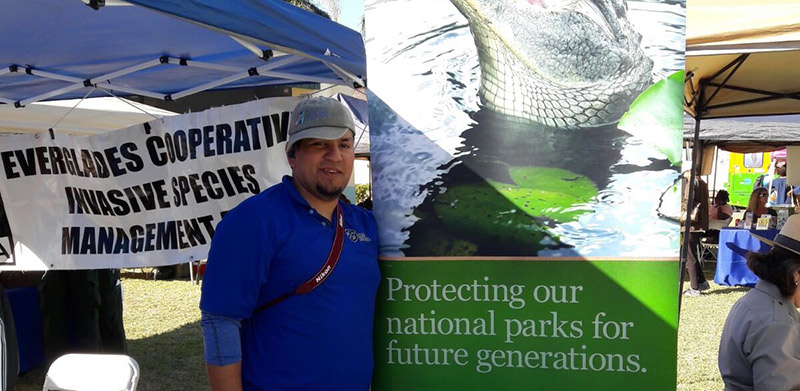The Battle for (Bio)Diversity
Feb 23, 2018

February 23, 2018
By David Riera, Fellow Alum
Social equality – or the lack thereof — has played a deciding role in how communities identify, thrive, survive, or die. Every community — from the veteran community to the conservation community — has to actively find those voices that have been left out of the conversation, and empower them to be heard.
As I reflect on the works of African American legends like Dr. King, George Washington Carver, the Buffalo Soldiers, and other personal heroes of mine, I am prompted to be mindful where social, economic, and environmental justice for all can (and needs to) be intertwined.
Volunteering with the National Parks Conservation Association through The Mission Continues Fellowship Program catapulted me into my desired field: environmental conservation.
Now as a veteran, scientist, and conservationist, I’ve begun to think more about the social dynamics of conservation.
My continued volunteer involvement has certainly taken me places – from talking to policymakers in Washington D.C. to environmental conferences in my home state of Florida.
I am grateful to the forward thinking of the Everglades Coalition (EvCo) and the National Parks Conservation Association for granting 20 Student Scholarships for 2018, and selecting me as one of them. Without this collaborative scholarship, I would have not been able to offset the cost of attendance.

National Parks Conservation Association Suncoast Regional Office Manager, Cheryl Swaby (left) at EvCo 2018.
When I attended this year’s EvCo I saw several different kinds of stakeholders, from agriculture, individuals facing the most immediate threat, Native American tribes, NGOs, and people like myself: scientists, teachers, students and artists.
While it was inspiring to see the diversity of perspectives in this environmental and socio-economic discussion, I think true inclusion of minorities has yet to be achieved in the environmental conservation space.
The environmental movement is not solely an interest of the socially or financially privileged. While diversity is at the forefront of numerous organizational inclusion programing, I still sense a cultural vulnerability where we are still not entirely part of this dynamic and green conversation, but we want to be! (This issue has been documented in Frontiers in Marine Science, and largely by Dorceta E. Taylor in the Journal of Environmental Education, Environmental Justice, and Green 2.0.)
This is why the environmental movement needs to dramatically increase the involvement of underprivileged and minority communities whose voices too often go unnoticed due to economic, educational, or even logistical restrictions.
Luckily, we are making progress on this front already.
I know there are many who are working toward this goal. My scholarship is just one great example – without it, I would not have been able to attend. But I know we all can do more. Because as a man with Latino and African American roots, I should not be able to look around a room and be the only person of color I see.
Preserving the Earth’s biodiversity needs an equally diverse audience of civic champions – that includes people of color, people from underprivileged backgrounds, and veterans too.
Wanting to help the environment should go hand in hand with empowering these minorities to take part too, if such progress is going to be equitable for all.
Report for duty in your community with The Mission Continues. Serve with a Service Platoon at an upcoming service event near you or apply for a fellowship. You can learn more about our programs on our website and stay updated on the latest news and announcements on Facebook and Twitter.






